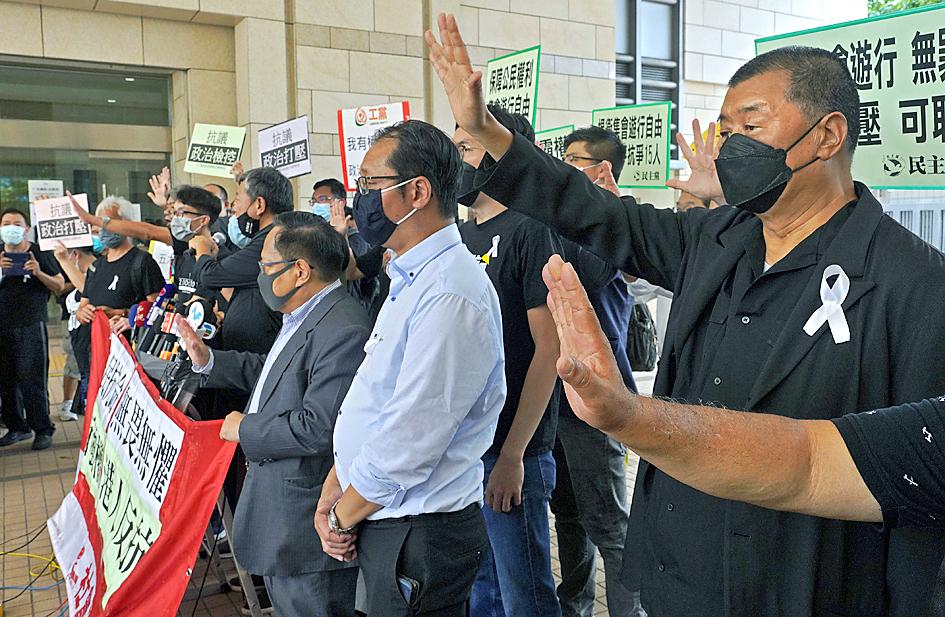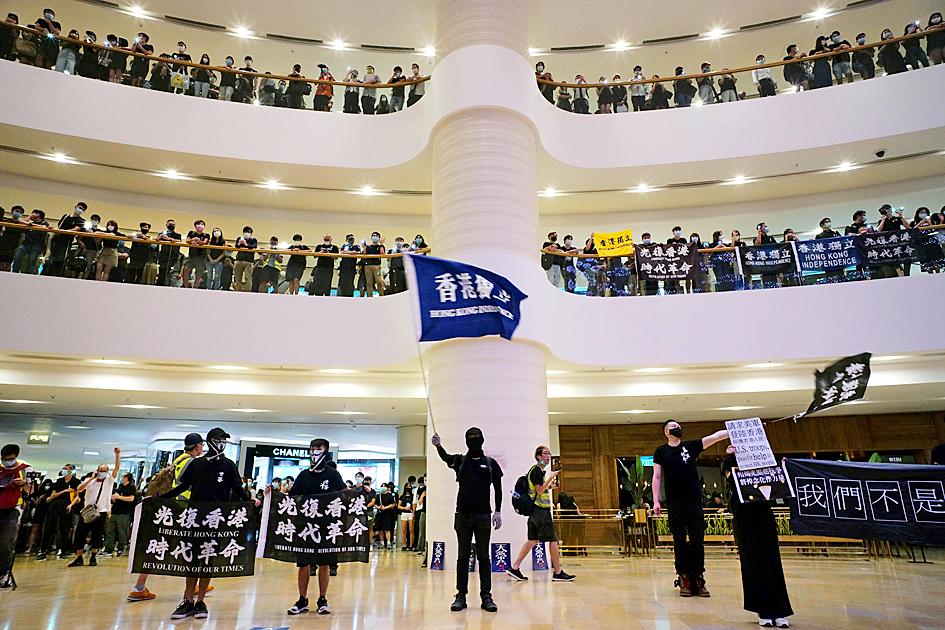China would have jurisdiction over “some extremely rare” national security cases in Hong Kong under new legislation to be imposed on the territory, a senior official said yesterday.
Hong Kong and Macau Affairs Office Deputy Director Deng Zhonghua (鄧中華) said enforcing the national security legislation would largely fall to Hong Kong’s local authorities and police.
“However, the central authorities should also reserve jurisdiction over some extremely rare cases when an offense takes place in Hong Kong and poses a serious threat to China’s national security,” Deng told a seminar in Shenzhen, China, organized by the semi-official Chinese Association of Hong Kong and Macao Studies think tank.

Photo: AP
Under the Basic Law of the Hong Kong Special Administrative Region of the People’s Republic of China adopted by the National People’s Congress (NPC) on April 4, 1990, Beijing said it would let Hong Kong maintain certain liberties and autonomy until 2047 — including legislative and judicial independence.
Deng’s comments are the first time a Beijing official has made clear that Chinese authorities would have jurisdiction over some national security cases once the proposed legislation is passed.
The NPC Standing Committee is expected to pass it as early as the end of this week.

Photo: AFP
“Both the central government and the Hong Kong government need to set up an organization dedicated to safeguard national security,” he said.
Central authorities would help “supervise and instruct” local authorities on enforcing national security, he said.
“The central authorities must have practical means to handle national security cases in Hong Kong and must be able to create an effective deterrence, instead of being satisfied with just chanting slogans and making gestures,” Deng said.
Deng said he recognized there were differences in the legal systems of Hong Kong and mainland China, but the new legislation would reflect common principles — including that the law would not be retroactive and as the presumption of innocence.
Pro-democracy Legislator Dennis Kwok (郭榮鏗) said he believed the announced jurisdiction plan would breach Hong Kong’s Basic Law.
“I think this is ... clear evidence that they are using this law as a label to quash political opposition,” he told reporters in Hong Kong.
In related news, 15 Hong Kong opposition figures facing prosecution over last year’s anti-government protests have applied to have their criminal proceedings put on hold, pending a proposed judicial challenge against the transfer of their case to the District Court, where they potentially face heavier penalties.
Lawyers for Avery Ng Man-yuen (吳文遠), one of the 15 charged over four unauthorized rallies between August and October, told West Kowloon Court that he would challenge a decision by prosecutors to move their trial.
The defendants, who include media tycoon Jimmy Lai (黎智英), Democratic Party founder Martin Lee (李柱銘) and incumbent and former pro-democracy legislators, face 61 charges following their arrests between February and April.
The offenses all carry a maximum sentence of five years in prison, but each is capped at two years in the magistrates’ courts.
The District Court can pass a maximum jail term of seven years.
Principal Magistrate Peter Law Tak-chuen (羅德泉) agreed to the request and is to hear counsel from both sides on July 15 on whether to suspend the present case until the resolution of the judicial challenge. The 15 remain on bail until then.
Meanwhile, hundreds of people dressed in black and wearing white ribbons gathered to remember the day last year when a 35-year-old man fell to his death from a shopping mall after unfurling banners against a now-withdrawn extradition bill.
Protesters stood atop the Pacific Place luxury shopping mall to remember Marco Leung (梁凌杰) — who was wearing a yellow raincoat when he fell — with a banner reading: “No extradition to China, fully retract the bill.”

BUILDUP: US General Dan Caine said Chinese military maneuvers are not routine exercises, but instead are ‘rehearsals for a forced unification’ with Taiwan China poses an increasingly aggressive threat to the US and deterring Beijing is the Pentagon’s top regional priority amid its rapid military buildup and invasion drills near Taiwan, US Secretary of Defense Pete Hegseth said on Tuesday. “Our pacing threat is communist China,” Hegseth told the US House of Representatives Appropriations Subcommittee on Defense during an oversight hearing with US General Dan Caine, chairman of the Joint Chiefs of Staff. “Beijing is preparing for war in the Indo-Pacific as part of its broader strategy to dominate that region and then the world,” Hegseth said, adding that if it succeeds, it could derail

CHIP WAR: The new restrictions are expected to cut off China’s access to Taiwan’s technologies, materials and equipment essential to building AI semiconductors Taiwan has blacklisted Huawei Technologies Co (華為) and Semiconductor Manufacturing International Corp (SMIC, 中芯), dealing another major blow to the two companies spearheading China’s efforts to develop cutting-edge artificial intelligence (AI) chip technologies. The Ministry of Economic Affairs’ International Trade Administration has included Huawei, SMIC and several of their subsidiaries in an update of its so-called strategic high-tech commodities entity list, the latest version on its Web site showed on Saturday. It did not publicly announce the change. Other entities on the list include organizations such as the Taliban and al-Qaeda, as well as companies in China, Iran and elsewhere. Local companies need

CROSS-STRAIT: The MAC said it barred the Chinese officials from attending an event, because they failed to provide guarantees that Taiwan would be treated with respect The Mainland Affairs Council (MAC) on Friday night defended its decision to bar Chinese officials and tourism representatives from attending a tourism event in Taipei next month, citing the unsafe conditions for Taiwanese in China. The Taipei International Summer Travel Expo, organized by the Taiwan Tourism Exchange Association, is to run from July 18 to 21. China’s Taiwan Affairs Office spokeswoman Zhu Fenglian (朱鳳蓮) on Friday said that representatives from China’s travel industry were excluded from the expo. The Democratic Progressive Party government is obstructing cross-strait tourism exchange in a vain attempt to ignore the mainstream support for peaceful development

ELITE UNIT: President William Lai yesterday praised the National Police Agency’s Special Operations Group after watching it go through assault training and hostage rescue drills The US Navy regularly conducts global war games to develop deterrence strategies against a potential Chinese invasion of Taiwan, aimed at making the nation “a very difficult target to take,” US Acting Chief of Naval Operations James Kilby said on Wednesday. Testifying before the US House of Representatives Armed Services Committee, Kilby said the navy has studied the issue extensively, including routine simulations at the Naval War College. The navy is focused on five key areas: long-range strike capabilities; countering China’s command, control, communications, computers, cyber, intelligence, surveillance, reconnaissance and targeting; terminal ship defense; contested logistics; and nontraditional maritime denial tactics, Kilby